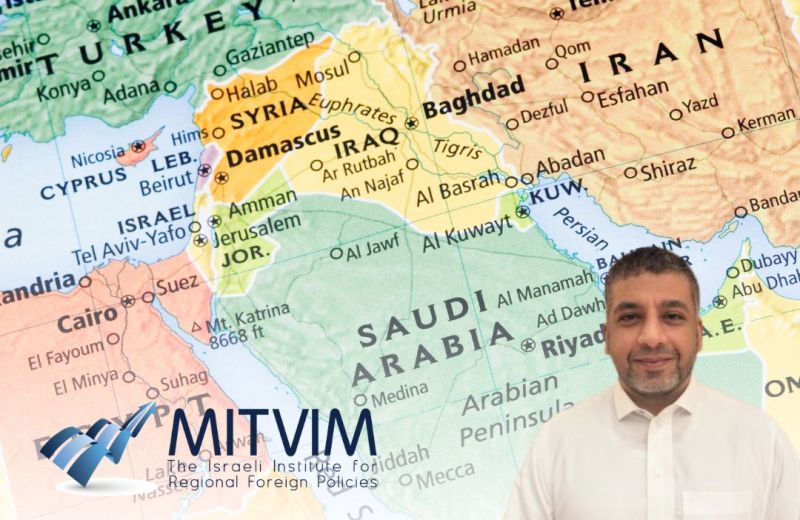 All Publications
/ Israel and Saudi Arabia
All Publications
/ Israel and Saudi Arabia
Dr. Aziz Alghashian is a Saudi researcher specializing in the kingdom’s foreign policy strategies. He is a senior research fellow at the Mitvim Institute. Alghashian is especially known as an expert on Saudi–Israeli relations and broader Arab–Israeli affairs.
Reef Itzhaki, Director of Impact at the Mitvim – the Israeli Institute for Regional Foreign Policies:
“President Trump’s recent visit to the Middle East stood out by skipping over Israel, while placing renewed strategic emphasis on Saudi Arabia and signaling interest in new partnerships with emerging actors like Syria. What are your main takeaways from this visit? And were there any aspects that surprised you?”
Dr. Aziz Alghashian:
“Let me begin by saying: I come from a Saudi-centered perspective and I’ll stay within that framework – focusing on Saudi policy toward Israel and the Palestinian issue.
In my view, the avoidance of any reference to Israel wasn’t surprising. Unfortunately, Netanyahu has made engagement with Israel too toxic, and Trump knew it would be too much to ask other Arab countries – especially Saudi Arabia – to cooperate.
Even at the Saudi-American Investment Forum, where he spoke, Trump mentioned the Abraham Accords, but didn’t address Saudi–Israeli normalization. To me, this was a way to frame those agreements as part of his legacy, rather than as a genuine regional shift.
What stood out most to me was the loss of Israeli agency in the region. Netanyahu has led to Israel being seen as just another variable in a U.S.–Saudi deal, rather than as an independent actor.
Trump’s decision to bypass Israel highlighted a strategic shift toward players like Saudi Arabia, Qatar, and the UAE – who have greater purchasing power and regional influence. At the same time, Israel’s agency has become increasingly marginal in both the Saudi-American and Gulf-American discourse.”
Reef Itzhaki:
“As you mentioned, the focus did indeed shift to Saudi Arabia. From Riyadh’s perspective, what message did this visit send to the region and to Israel in particular?”
Dr. Aziz Alghashian:
“Saudi Arabia is effectively becoming the regional center of gravity. You could even say that the entire Gulf Cooperation Council (GCC) is taking on this role, with Saudi Arabia at its helm.
Trump’s announcement about lifting sanctions on Syria and his openness to normalize relations with it indicate that Saudi diplomacy has been both proactive and effective. There was a sense of a ‘ripe moment’ – this wasn’t accidental, but the result of quiet, strategic Saudi diplomacy.
This move helps reintegrate Syria into the Arab fold, and enables the GCC states to follow suit, while still exercising fiscal caution. Saudi Arabia won’t invest where there’s no political certainty.
Once sanctions are lifted, it becomes easier to channel financial aid – enabling Syria’s gradual return to the regional system.”
Reef Yitzhaki:
“Before the current government, Israel positioned itself as a proactive player in regional diplomacy. However, there’s a growing sense that it is now perceived as blocking rather than advancing regional initiatives. From Saudi Arabia’s point of view, is Israel now considered a partner or a hindrance?”
Dr. Aziz Alghashian:
“Unfortunately, Israel is currently seen as a spoiler.
Once – especially in 2021 – even Mohammed bin Salman referred to it as a ‘potential ally.’ The Arab Spring was a turning point – it brought about a certain regional alignment, and Israel was perceived differently at the time.
But over time – especially due to Israel’s political volatility and Netanyahu’s effect – the Saudis have realized it’s far more complex.
After the Abraham Accords, there was hope that this was a constructive step. But the Accords were used negatively, especially by extremist elements, as proof that the Palestinian issue was being sidelined – and this deeply hurt Israel’s image.
Even before October 7, there was talk of normalization – but conditional on significant Israeli concessions. Today, peace and normalization seem worlds apart.
To many, normalization was portrayed as a way to bypass the Palestinian issue – and that’s what damaged trust.
I remember during the Second Intifada, Israel had an extremely negative image – that sentiment hadn’t returned until recent years.
Even in May 2021 there were clashes, but what’s happening now is far more severe. There’s also a deeper understanding now – that Saudi Arabia sees Israel not just as a party to the Gaza conflict, but as responsible for other regional threats as well.
Saudi public opinion has moved far away – one step forward, a hundred steps back.”
Reef Itzhaki:
“At the summit, regional stability was a central theme, especially following the meeting between Trump, Mohammed bin Salman, and President al-Sharaa, which gave renewed legitimacy to the Syrian government.
What is Saudi Arabia’s long-term vision for Syria’s role in the region and for stabilizing the area?”
Dr. Aziz Alghashian:
“Saudi Vision 2030 was conceived at the height of a wave of Saudi nationalism, with slogans like ‘Saudi Arabia First.’ Today, we’ve moved to the phase of ‘Saudi Arabia – and then others.’
There’s a clear understanding that the vision cannot be realized without regional stability.
The political conflicts have emphasized just how fragile the region is – and how vital it is for Saudi Arabia’s progress.
So the question isn’t just how Saudi Arabia can stabilize the region, but also how others can contribute to that effort.
We need to speak a pragmatic language, understand others’ interests and their fears. When interests are framed as shared, it becomes easier for Saudi Arabia to engage.
That’s also why it supported al-Assad – not out of coercion, but because the messages it heard aligned with its own positions.
When the vision is clear and tangible – support follows.”


